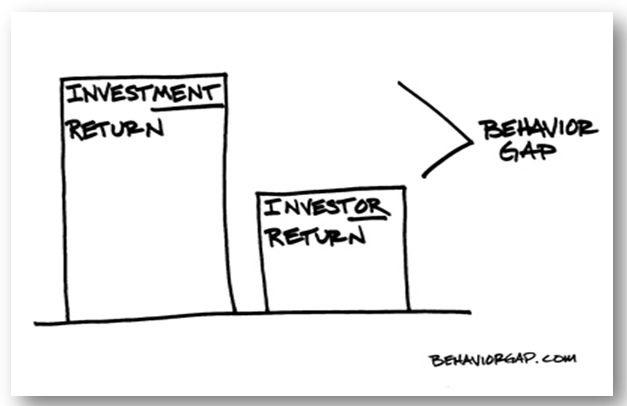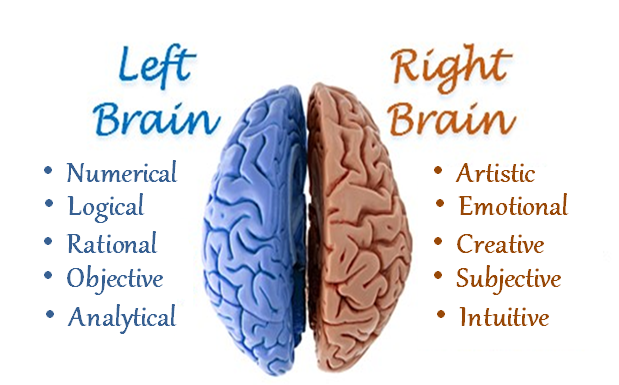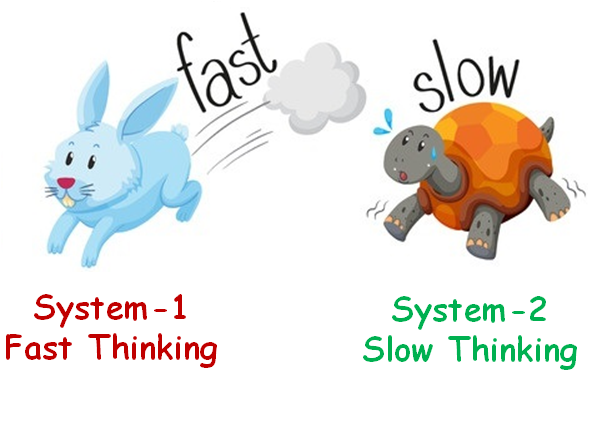- March 9, 2017
- by Prakash Lohana
- Articles
- 550 Views
- 0 Comments
Till now I have written many articles on different topics of personal finance but this is my first article on “How Psychology plays an important role in your financial decisions?”
When I say Psychology plays important role in your financial decisions, it looks very odd at first instance. Apparently it looks that finance has nothing to do with psychology but let me tell you that your psychology plays a very important role in your success as an investor. Let us see this in detail.
How Investor Returns different from Investment Returns?
I have been in financial advisory practice since last twelve years now, and have observed that equity markets are giving good returns since long but investors are not able to earn that much returns. For example, Sensex which is index of 30 Large cap companies of India was started somewhere in April-1979 with a base of 100 and today it is more than 26000. So it shows that if someone had invested one lakh in Sensex in 1979 then his one lakh has become more than two crores and sixty lakhs in a period of around 37 years. Here returns are more than 15% compounded annualized. But when I look at investors I hardly find any investor who could earn 15% p.a. kind of compounded returns in their portfolio over such long periods. So why investors are not able earn this kind of returns. Simple reason for this is our mistakes.

This picture shows this very clearly. Investment returns are much higher but investor returns are on lower side. So investments have given returns but investors have failed to gain those returns and this is due to behavioral gap. Investors behave in a manner that affects their returns negatively. In this regard conventional finance theory says that investors are rational and they act in a rational manner while taking their investment decision. Whereas Behavioral finance theory which has been developed off late in last two to three decades says that investors are emotional and they act in an emotional way while taking decisions related to their investments.
Left Brain v/s Right Brain Theory:
Now the question is why investors act emotionally and not rationally while making their investment decisions.  There are different theories to this, one very famous and universally known theory is Right Brain : Left Brain theory which says that there are two sides of our brain, left and right. Left brain is more logical, rational, analytical brain which processes numbers, logic,etc., Whereas, Right brain is more emotional, subjective, creative and acts in an intuitive manner. People who are left brain oriented are logical and take rational decision where as people who are right brain oriented are emotional and behave emotionally. But my experience says that people generally use left brain in their own profession or business and use right brain in rest of the areas in life, Let me take an example of a doctor suppose a doctor gets a call from a patient says that his son his suffering from fever and has stomach pain and asks him to give some medicine then what would doctor do? Doctor will not prescribe a medicine on phone he will ask him to bring the patient to hospital and will recommend the medicine only after proper diagnosis. But suppose for the same doctor if one of his best friends, who is also a doctor but keeps reading magazines on finance suggest him to buy shares of a company very strongly what will he do. Mostly doctor will buy those shares. So when he had to take decision in his own profession where his core competence lies he prefers to do detailed analysis but in financial decisions he is ready to rely on a person who is not a professional and don’t want to even see whether he has done proper research or not. He is using left brain in his own profession and right brain in other areas of life. Same happens with everyone, we use left brain in our profession and right brain in other areas of life.
There are different theories to this, one very famous and universally known theory is Right Brain : Left Brain theory which says that there are two sides of our brain, left and right. Left brain is more logical, rational, analytical brain which processes numbers, logic,etc., Whereas, Right brain is more emotional, subjective, creative and acts in an intuitive manner. People who are left brain oriented are logical and take rational decision where as people who are right brain oriented are emotional and behave emotionally. But my experience says that people generally use left brain in their own profession or business and use right brain in rest of the areas in life, Let me take an example of a doctor suppose a doctor gets a call from a patient says that his son his suffering from fever and has stomach pain and asks him to give some medicine then what would doctor do? Doctor will not prescribe a medicine on phone he will ask him to bring the patient to hospital and will recommend the medicine only after proper diagnosis. But suppose for the same doctor if one of his best friends, who is also a doctor but keeps reading magazines on finance suggest him to buy shares of a company very strongly what will he do. Mostly doctor will buy those shares. So when he had to take decision in his own profession where his core competence lies he prefers to do detailed analysis but in financial decisions he is ready to rely on a person who is not a professional and don’t want to even see whether he has done proper research or not. He is using left brain in his own profession and right brain in other areas of life. Same happens with everyone, we use left brain in our profession and right brain in other areas of life.
Fast Thinking v/s Slow Thinking System in our Brain:
 The second theory is given by Daniel Kahneman, a psychologist and Noble price winner in Economics who said that our brain has two systems, first is system -1 Fast Thinking System which thinks very fast, intuitive, emotional, subconscious and acts on a snap assessment of situation very quickly. Second is system-2 Slow Thinking System which is slow, rational, logical and reacts to situation slowly after detailed analysis of the situation. Let us see with illustration. If I ask you that 2+2 is how much you will immediately say 4. If I ask you 4+4 you will say 8. But if I ask you 6X9X7X18= then you will stop thinking and make calculations. So when you answered first two questions you used system 1 which is a fast thinking and answered the questions immediately but when the third question came your system 1 could not answer that and the question was sent to system 2 that is slow thinking system for calculation and detailed analysis. Let me ask you one more question here. There is one combo offer in a shop where one chocolate is available with a small candy in total of Rs. 11. There is no discount and price of chocolate is 10 Rs. more than price of candy. Now question is what is the price of Candy? Most of you will say that it is Rs. 1 but think quietly. If price of candy is Rs. 1 then and price of chocolate is Rs. 10 more than price of candy then price of chocolate will become Rs. 11 and total will become Rs.12. But total price is Rs. 11 only. So price of candy is Rs. 0.50. Now think why most of people at first instance give answer that candy’s price as Rs. 1? Because they use System -1 which is fast thinking system because question looks very simple so they don’t do detailed analysis and do snap assessment. This is what happens in real life while taking financial decisions because they look very simple but they are not so simple.
The second theory is given by Daniel Kahneman, a psychologist and Noble price winner in Economics who said that our brain has two systems, first is system -1 Fast Thinking System which thinks very fast, intuitive, emotional, subconscious and acts on a snap assessment of situation very quickly. Second is system-2 Slow Thinking System which is slow, rational, logical and reacts to situation slowly after detailed analysis of the situation. Let us see with illustration. If I ask you that 2+2 is how much you will immediately say 4. If I ask you 4+4 you will say 8. But if I ask you 6X9X7X18= then you will stop thinking and make calculations. So when you answered first two questions you used system 1 which is a fast thinking and answered the questions immediately but when the third question came your system 1 could not answer that and the question was sent to system 2 that is slow thinking system for calculation and detailed analysis. Let me ask you one more question here. There is one combo offer in a shop where one chocolate is available with a small candy in total of Rs. 11. There is no discount and price of chocolate is 10 Rs. more than price of candy. Now question is what is the price of Candy? Most of you will say that it is Rs. 1 but think quietly. If price of candy is Rs. 1 then and price of chocolate is Rs. 10 more than price of candy then price of chocolate will become Rs. 11 and total will become Rs.12. But total price is Rs. 11 only. So price of candy is Rs. 0.50. Now think why most of people at first instance give answer that candy’s price as Rs. 1? Because they use System -1 which is fast thinking system because question looks very simple so they don’t do detailed analysis and do snap assessment. This is what happens in real life while taking financial decisions because they look very simple but they are not so simple.
System 1 is the Fast thinking system of the brain which works on emotions, intuitions and snap assessment of the situation and answers questions very fast. System 1 has its uses in the daily life. Suppose you are driving a car and suddenly a truck comes on your way what will you do? Simply you will trigger the break and stop the car. So here you actually did not do any analysis it happens on it’s own. Here system 1 which is fast thinking part of the brain works and stops the car. So system 1 which is fast thinking is a survival system. It helps us to survive because if in above example you use system 2 and do detailed analysis then by that time you will meet an accident.
Both system 1- Fast thinking and system 2- Slow thinking are not opposite to each other, they are complementary to each other and both are important for us. But sometimes we use system 1 – Fast thinking system at places where we should use system 2, and that leads us to wrong conclusions.
While taking investment decisions we make the same mistake we do a basic, intuitive analysis and take decisions based on that analysis so questions which look very simple like above case of chocolate and candy are actually complex and need detailed analysis.
In my next article I will be discussing some psychological biases which affect our decision making process in investments.

